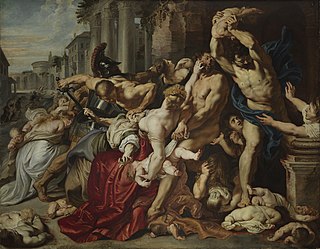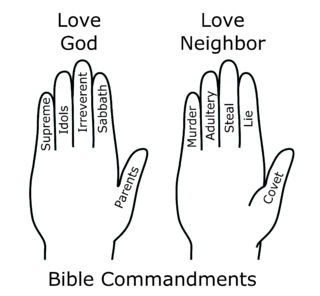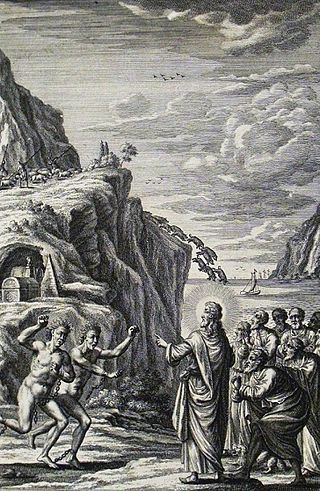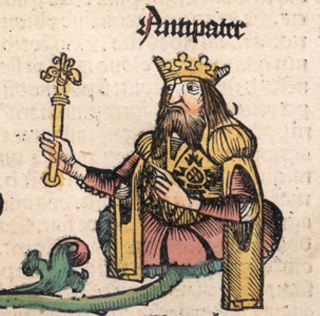| Matthew 8:30 | |
|---|---|
← 8:29 8:31 → | |
 "Herd of Swine" by Charles-Émile Jacque (1868) | |
| Book | Gospel of Matthew |
| Christian Bible part | New Testament |
Matthew 8:30 is the 30th verse in the eighth chapter of the Gospel of Matthew in the New Testament.
| Matthew 8:30 | |
|---|---|
← 8:29 8:31 → | |
 "Herd of Swine" by Charles-Émile Jacque (1868) | |
| Book | Gospel of Matthew |
| Christian Bible part | New Testament |
Matthew 8:30 is the 30th verse in the eighth chapter of the Gospel of Matthew in the New Testament.
In the original Greek according to Westcott-Hort, Textus Receptus and Byzantine Majority, this verse is:
In the King James Version of the Bible the text reads:
The New International Version translates the passage as:
For a collection of other versions see BibleHub Matthew 8:30.
This verse is a part of the narrative to show Jesus' authority and his relationship to the Gentiles (cf. Matthew 8:5–13). The location in the Decapolis and the fact that swine are being raised nearby indicate a non-Jewish area, along the east coast of the Sea of Galilee where the population was mixed. [1] The Jews do not eat pork, but Roman soldiers did, so the swine may have been kept to supply the food for the Roman 'legion'. [2] Augustus was reported to have said that 'it was better to be "Herod's swine than son"', [3] seemingly implying that Herod did keep swine herds on his estates, perhaps for supplying the Romans. [2] The scene with pigs in the passage provides irony and humor which are familiar to Matthew's Jewish audience. [4]

The Gospel of Matthew is the first book of the New Testament of the Bible and one of the three synoptic Gospels. It tells how Israel's Messiah, Jesus, comes to his people but is rejected by them and how, after his resurrection, he sends the disciples to the gentiles instead. Matthew wishes to emphasize that the Jewish tradition should not be lost in a church that was increasingly becoming gentile. The gospel reflects the struggles and conflicts between the evangelist's community and the other Jews, particularly with its sharp criticism of the scribes and Pharisees with the position that through their rejection of Christ, the Kingdom of God has been taken away from them and given instead to the church.

Matthew 2:16 is the sixteenth verse of the second chapter of the Gospel of Matthew in the New Testament.

Matthew 5:30 is the thirtieth verse of the fifth chapter of the Gospel of Matthew in the New Testament and is part of the Sermon on the Mount. Part of the section on adultery, it is very similar to the previous verse, but with the hand mentioned instead of the eye. For a discussion of the radicalism of these verses see Matthew 5:29. Jesus had stated that looking at a woman in lust is equal to the act of adultery itself and in this verse he hyperbolically recommends cutting off one's hand to prevent sinning.

Matthew 5:38 is the thirty-eighth verse of the fifth chapter of the Gospel of Matthew in the New Testament and is part of the Sermon on the Mount. This verse begins the antithesis on the commandment: "Eye for an eye".

Matthew 28:19 is the nineteenth verse of the twenty-eighth chapter of the Gospel of Matthew in the New Testament. This verse is part of the Great Commission narrative, containing the command to go, teach and baptize new disciples with the trinitarian formula.

Matthew 6:4 is the fourth verse of the sixth chapter of the Gospel of Matthew in the New Testament and is part of the Sermon on the Mount. This is the final verse of the Sermon's discussion of alms giving.

Matthew 23 is the twenty-third chapter in the Gospel of Matthew in the New Testament section of the Christian Bible, and consists almost entirely of the accusations of Jesus against the Pharisees. The chapter is also known as the Woes of the Pharisees or the "Seven Woes". In this chapter, Jesus accuses the Pharisees of hypocrisy. Some writers treat it as part of the fifth and final discourse of Matthew's gospel.

Matthew 14 is the fourteenth chapter in the Gospel of Matthew in the New Testament section of the Christian Bible. It continues the narrative about Jesus' ministry in Galilee and recounts the circumstances leading to the death of John the Baptist.
Matthew 16 is the sixteenth chapter in the Gospel of Matthew in the New Testament section of the Christian Bible. Jesus begins a journey to Jerusalem from the vicinity of Caesarea Philippi, near the southwestern base of Mount Hermon. Verse 24 speaks of his disciples "following him".

Matthew 22 is the twenty-second chapter in the Gospel of Matthew in the New Testament section of the Christian Bible. Jesus continues his final ministry in Jerusalem before his Passion. Teaching in the Temple, Jesus enters into debate successively with the Pharisees, allied with the Herodians, the Sadducees, and a lawyer, ultimately silencing them all.
Matthew 28:15 is the fifteenth verse of the twenty-eighth chapter of the Gospel of Matthew in the New Testament. This verse is part of the resurrection narrative, providing the story on how the unbelievers treated the facts.

Matthew 9:7 is the seventh verse in the ninth chapter of the Gospel of Matthew in the New Testament.

Matthew 9:8 is the eighth verse in the ninth chapter of the Gospel of Matthew in the New Testament.

Matthew 8:5 is the fifth verse of the eighth chapter of the Gospel of Matthew in the New Testament. This verse begins the miracle story in which a centurion's servant is healed, the second of a series of miracles reported in Matthew.

Matthew 8:31 is 31st verse in the eighth chapter of the Gospel of Matthew in the New Testament.

Matthew 8:33 is the 33rd verse in the eighth chapter of the Gospel of Matthew in the New Testament.

Antipater II was Herod the Great's first-born son, his only child by his first wife Doris. He was named after his paternal grandfather Antipater the Idumaean. He and his mother were exiled after Herod divorced her between 43 BC and 40 BC to marry Mariamne I. However, he was recalled following Mariamne's fall in 29 BC and in 13 BC Herod made him his first heir in his will. He retained this position even when Alexander and Aristobulus rose in the royal succession in 12 BC, and even became exclusive successor to the throne after their execution in 7 BC.

Acts 23 is the twenty-third chapter of the Acts of the Apostles in the New Testament of the Christian Bible. It records the period of Paul's imprisonment in Jerusalem and then in Caesarea. The book containing this chapter is anonymous, but early Christian tradition uniformly affirmed that Luke composed this book as well as the Gospel of Luke.

Romans 2 is the second chapter of the Epistle to the Romans in the New Testament of the Christian Bible. It is authored by Paul the Apostle, while he was in Corinth in the mid-50s AD, with the help of an amanuensis (secretary), Tertius, who adds his own greeting in Romans 16:22. Although "the main theme of the Epistle [is] the doctrine of justification by faith", in verse 6 Paul "lays down with unmistakable definiteness and precision the doctrine that works, what a man has done, the moral tenor of his life, will be the standard by which he will be judged at the last day".

Romans 3 is the third chapter of the Epistle to the Romans in the New Testament of the Christian Bible. It was composed by Paul the Apostle, while he was in Corinth in the mid-50s AD, with the help of an amanuensis (secretary), Tertius, who added his own greeting in Romans 16:22.
Cum audisset inter pueros quos in Syria Herodes rex Iudaeorum intra bimatum iussit interfici filium quoque eius occisum, ait: Melius est Herodis porcum esse quam filium. transl. la – transl. But hearing these words, Herod, King of the Jews within the two years in length between
the boys whom they gave orders to have been killed in Syria and the son of his, too, had been
slain, and he said: It is better to be Herod's swine than his son
| Preceded by Matthew 8:29 | Gospel of Matthew Chapter 8 | Succeeded by Matthew 8:31 |